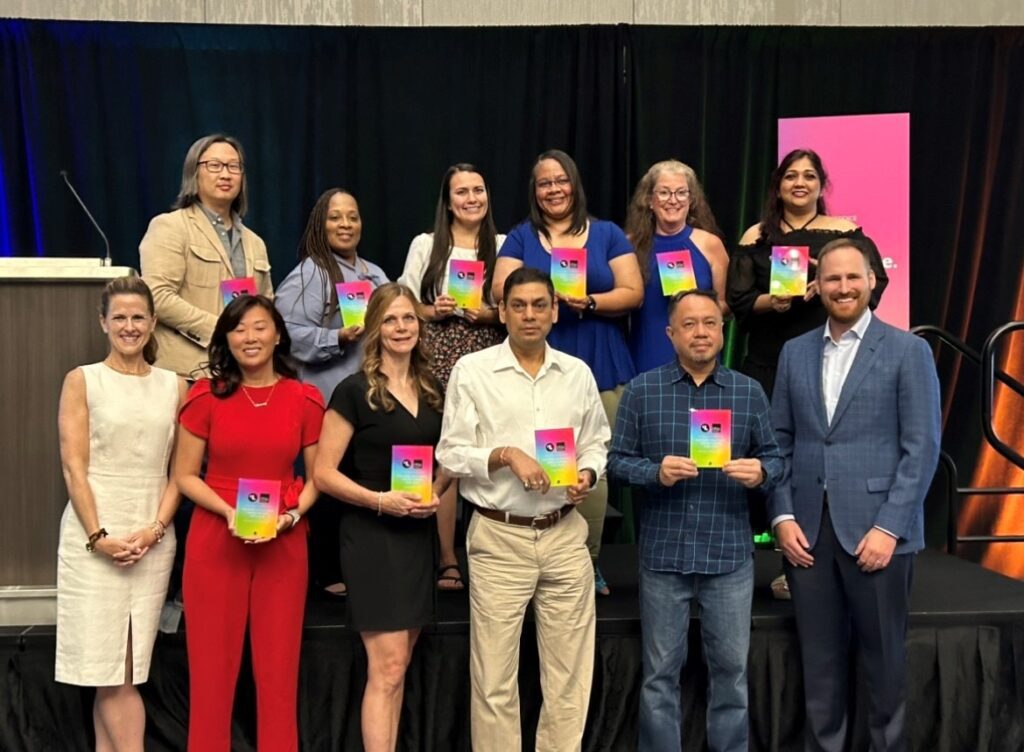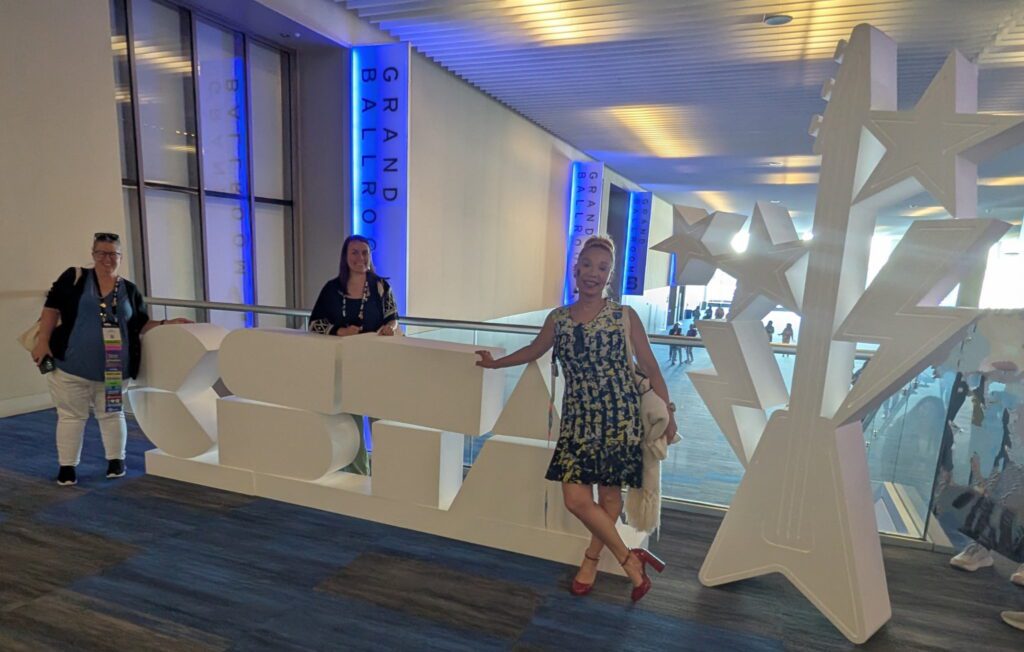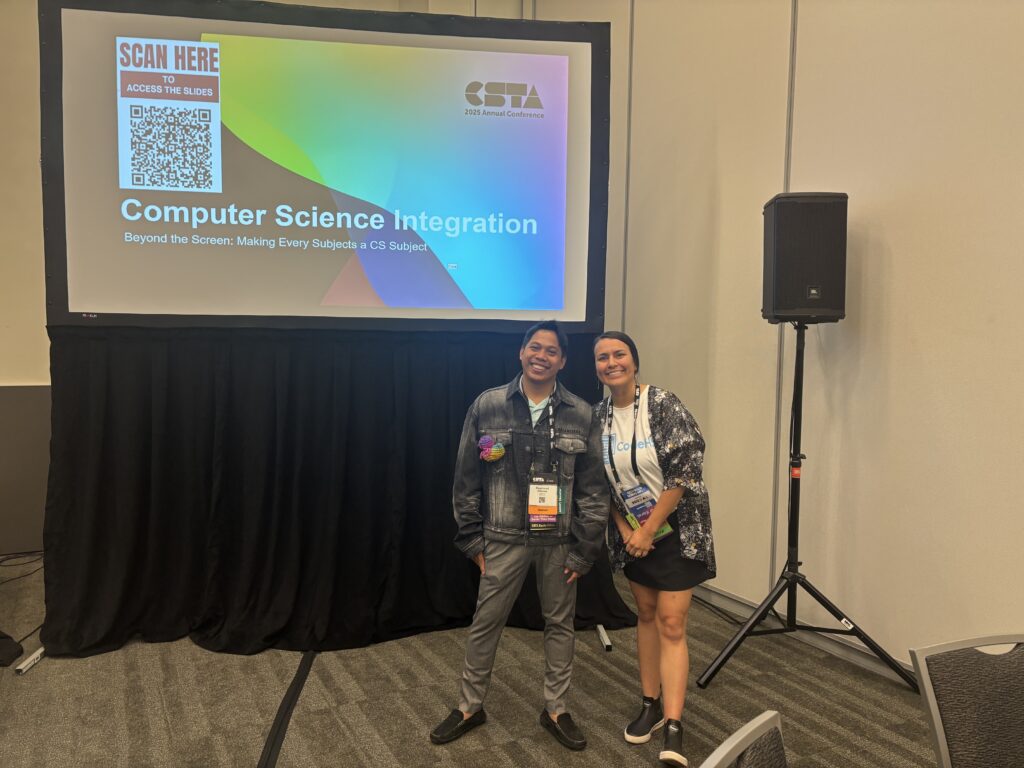Welcome to the CSTA Volunteer Spotlight series, where we celebrate the incredible individuals who dedicate their time and passion to making a difference in the CSTA community. Join us in recognizing and appreciating the extraordinary efforts of awards committee member Jessa Miles.
What inspired you to volunteer your time with CSTA? How has this experience impacted you?

I was inspired to volunteer with CSTA because of my passion for expanding access to computer science and supporting educators in creating opportunities for all students. Growing up, I did not see people who looked like me represented in STEM fields, and I know firsthand how important it is for students to have role models and pathways into technology. CSTA’s mission aligns with my belief that every learner deserves the chance to explore computer science in engaging and inclusive ways.
Volunteering has given me the opportunity to connect with a diverse network of educators who share a commitment to equity and innovation. Serving on the Awards Committee has allowed me to highlight and celebrate the work of teachers who are making a difference in their schools and communities. It has also deepened my understanding of the national landscape of computer science education and inspired new ideas that I can bring back to my own district.
This experience has impacted me both personally and professionally. It has reinforced the value of advocacy, strengthened my leadership skills, and reminded me that small contributions at the local, state, and national level can have a lasting impact on students and the future of computer science.
How long have you been involved with CSTA, and what motivated you to join?
This is my second year being involved with CSTA. I was motivated to join the CSTA community because I believe in the power of collaboration and equity in computer science education. Growing up, I did not see many people who looked like me represented in STEM, and I want to be part of changing that story for today’s learners. CSTA provides a supportive space where educators can connect, share ideas, and advocate for expanding access to computer science for all students, especially those who have been historically underrepresented.
Being part of CSTA allows me to grow as an educator by learning from others, staying current with emerging tools and practices, while discovering new strategies to bring back to my schools. It also provides opportunities for leadership, such as serving on committees or contributing to initiatives that celebrate the work of teachers who are making a difference in their classrooms and communities.
Most importantly, the CSTA community reminds me that I am not alone in this work. By joining, I gain colleagues who share my passion for equity, innovation, and student success. Together, we can advocate for meaningful opportunities in CS education and ensure that all learners see themselves as creators, problem-solvers, and future leaders in technology.
Can you share any memorable experiences or highlights from your involvement with CSTA?


One of the most memorable experiences from my involvement with CSTA has been attending the annual conferences. Last summer in Las Vegas, I was inspired by the energy of educators from across the country and the wealth of practical ideas shared. This summer in Cleveland, Ohio, I had the opportunity to attend the volunteer forum, collaborating with fellow volunteers on initiatives to support computer science education.
A highlight of the Cleveland conference was the warmth and generosity of the CSTA community. Members from Texas welcomed me into their network, sharing resources, strategies, and insights from their own classrooms. Their willingness to include me and provide guidance exemplified the supportive and collaborative spirit of CSTA.
Beyond the conferences, these interactions have reinforced the value of being part of a national community committed to equity, innovation, and student success in computer science. The personal connections I’ve made, the shared learning, and the chance to contribute to meaningful initiatives have been both professionally enriching and personally inspiring. These experiences continue to motivate me to volunteer, advocate, and grow as an educator while helping ensure that all students have access to high-quality CS learning opportunities.
How has CSTA impacted your teaching career and professional development?

CSTA has had a significant impact on my teaching career and professional development by providing access to a national community of educators, resources, and opportunities that have deepened my expertise in computer science education. Through CSTA, I have been able to stay current with emerging tools, pedagogical strategies, and research, which has allowed me to design more engaging, equitable, and hands-on learning experiences for my students.
Participation in CSTA conferences, volunteer forums, and committees has strengthened my leadership skills and expanded my professional network. Collaborating with educators from diverse regions and backgrounds has inspired new approaches to integrating technology and CS across grade levels and subjects. The mentorship, support, and shared resources I’ve received have helped me implement innovative lessons, lead professional development for colleagues, and advocate for broader access to CS education in my schools and community.
Perhaps most importantly, CSTA has reinforced my commitment to equity in computer science, reminding me that access, representation, and inclusion are essential for student success. Being part of this community has empowered me to not only grow as an educator but also to contribute to a national movement that ensures every learner has the opportunity to explore, create, and thrive in computer science.
In what ways do you see CSTA shaping the future of computer science education?
CSTA is shaping the future of computer science education by creating a national network that supports educators, promotes equity, and advances best practices in teaching and learning. By providing high-quality resources, professional development, and opportunities for collaboration, CSTA empowers teachers to bring computer science into classrooms in meaningful, engaging, and accessible ways.
The organization’s emphasis on equity ensures that students from all backgrounds have the opportunity to explore computer science, see themselves represented in STEM, and develop critical skills for the future. CSTA also fosters innovation by connecting educators with emerging tools, pedagogical strategies, and real-world applications, helping students become creators, problem-solvers, and contributors to society.
Through conferences, volunteer initiatives, and collaborative forums, CSTA encourages the sharing of ideas, mentorship, and leadership development among educators. This collective effort not only strengthens individual teachers but also builds a robust, forward-looking community that influences curriculum design, policy, and classroom practices nationwide.
By uniting educators around common goals and providing resources and support, CSTA is ensuring that computer science education continues to grow, evolve, and remain relevant for all students. Its work lays the foundation for a future where students are not just consumers of technology but confident innovators and lifelong learners in an increasingly digital world.
Are there any specific initiatives or projects within CSTA that you’ve been particularly passionate about?
I have been particularly passionate about CSTA’s initiatives that recognize and celebrate excellence in computer science education. Serving on the Awards Committee has allowed me to highlight the impactful work of educators who are making a difference in their schools and communities. I deeply value the opportunity to support equitable recognition and elevate voices that might otherwise go unnoticed.
Additionally, I am inspired by CSTA’s commitment to professional development and networking. Programs that provide mentorship, resources, and opportunities to share best practices empower educators to grow and innovate in their teaching. Being part of the conversation has enhanced my ability to implement hands-on, student-centered learning, support colleagues in integrating CS across grade levels, and advocate for inclusive computer science education.
Overall, the initiatives I am most passionate about are those that combine recognition, collaboration, and equity. This allows educators and students alike to thrive while advancing the field of computer science education.
What does the future of CSTA look like?
The future of CSTA looks bright and transformative, as it continues to expand access to high-quality computer science resources for all. I see CSTA growing its network of educators, fostering collaboration across regions, and providing increasingly innovative resources and professional development opportunities. By supporting teachers in integrating CS across grade levels and subjects, CSTA is helping ensure that students develop not only technical skills but also critical thinking, creativity, and problem-solving abilities.
Equity will remain a central focus of CSTA’s work, ensuring that historically underrepresented students have access to meaningful CS learning experiences and can see themselves as future innovators. Through current initiatives and programs, CSTA will continue to cultivate a strong, supportive community of educators who share best practices, advocate for students, and lead change in their schools and districts.
In the coming years, I envision CSTA influencing curriculum development, shaping policy, and fostering collaborations that connect classrooms with real-world applications of computer science. Its future lies in empowering educators and students alike to thrive in a rapidly evolving technological world, ensuring that computer science education is inclusive, relevant, and transformative for generations to come.

